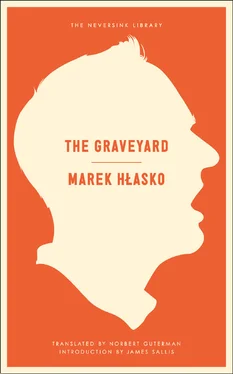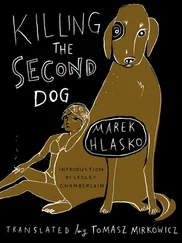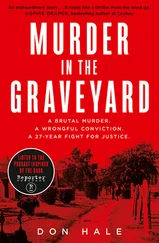“You’re a hard man, Jerzy,” I said. “And what if I had reported to the clouds?”
He shrugged. “We would have given you a funeral, anyway,” he said. “Though you know yourself that there’s no time for such things.”
“You’re a hard man,” I repeated. “It takes a special kind of courage to talk like that.”
He struggled with his cigarette, rerolling the treacherous paper over and over. “I don’t know what courage really is,” he said. Despite his efforts, his cigarette kept falling apart. “I’ve thought about it all my life. As a boy, I had a different idea of it — rescuing somebody from fire or water, performing a heroic action in war, raping my grandmother, that kind of thing. Now these things have to be reconsidered. All the usual opinions about courage are based on the idea of exceptional circumstances. But at bottom a man’s behavior in battle or during a fire tells us nothing about him, but only shows how he reacts in such situations. In abnormal circumstances you get abnormal reactions; nothing that can be foreseen, and nothing to be surprised at.”
“Is there such a thing as normal courage?”
He was silent for a moment; his cigarette had disintegrated for good. He rolled the remnants of tobacco between his fingers. “I think there is,” he said. “Courage is probably just a matter of faith. People are nothing but a herd of swine wallowing in a sea of shit. It’s easy to define man in his lower aspects — he is infinitely beastly; he is capable of everything; he’ll believe everything and befoul everything. Courage in the truest sense is ability to find man’s upper, ultimate limits — the extent to which he can be trusted and is capable of achievement. That is how I understand Communism. As for you, I was sure you’d pull through.”
“In order to kill?”
“In the name of life.”
“And our enemies?”
“What about our enemies?”
“Don’t they think the same way?”
He shrugged again. “I don’t know what they think,” he said. “I only know in the name of what they kill, and that is what matters to me in this war. I know what they did to man, and I know what I want man to be: this entitles me to take part in the game. I want an epoch and an earth that will make it possible for man to be truly courageous. That’s the only thing I’m interested in.” He rose; his boots creaked unpleasantly. “While the war is on, don’t try to find justifications that don’t exist,” he said. “The only thing you can do is to think about the world you want to go back to, the place you want to live in. Distance between dream and reality defines a man’s morality, nothing more. Haven’t you got a decent cigarette?”
He lighted one. We set out. Where? To what place of life, dream, war? I don’t remember. We were approaching a little town; there were only a few of us. We were supposed to find somebody in the market, a fellow who thought he was terribly smart, a secret agent of the Gestapo, and to blast him out of existence. It was noon. The August air was thick as cheese. When we emerged from the woods and saw the town spread out below us — a dirty little place — bells began to ring, gloomy and helpless in the torrid air. Then a factory siren began to wail; as far as I know there was only one factory in this hole.
“The siren operator must have been asleep,” Jerzy said.
“Why? Maybe he let the church have priority.”
“You go to the left, and we’ll go to the right …”
The taxicab stopped with a screech a few steps behind Franciszek. He jumped aside like a rabbit. The driver, furious, leaned out the window. “Didn’t you hear my horn?”
“I’m sorry; I was thinking,” Franciszek said, staring at his mud-spattered overcoat.
“Where are you going?” the driver asked. His motor gave off black fumes. “Want a lift?”
“Thanks,” Franciszek said. “I’ll walk.”
The car rolled on, and vanished beyond the street corner. After a few dozen yards the street was suddenly all lit up. A night shift was working on a building; elevators whirred inside the stone walls; platforms swinging like big formless birds moved slowly upward; the green light of drilling crews gleamed from dark scaffoldings that merged with the empty sky — lumpy human spiders amid showers of burning metal. Compressors hissed monotonously in the ditches; a sign said:
“THIS MONTH WE HAVE FULFILLED …” The figures were hidden in the shadows.
“Where are you going?” cried someone he could not see. “No loitering here; this is a construction project.”
… “We build everything from the foundations up — if I may use big words — from the very fundamentals.” Someone — who was it? — had said that at the meeting. “We are building something in the name of which people have died not by dozens and not by hundreds, but by whole generations. The struggle for social justice began the moment two people first met in the world. Socialism is the final form of this struggle (applause); the sacrifices made by the party (applause), the martyrs of socialism (applause) …” A short interruption — and what next?…
He was tired; he was dragging himself through the night and its murky echoes; a dark wave was pulsing within him, growing stronger and stronger. Now he was walking across a vacant lot, through aseptically clean places, with a lump of lead in his head; he could not strike a single spark in himself. He wanted only one thing — to relive the moment he had experienced a few hours earlier, although between that moment and now there was a whole life — years, oceans, worlds of defeat, loneliness, exhaustion, futility. Thus reviewing the different areas of his life, he was unable to fix them in time: the past, the present, memories and facts, everything was fluid, incomprehensible; he thought only of that moment which was the kernel of the universe — the moment when someone had told him to turn in his party card. That was real — as real as the street he was walking in, as real as the shabby dawn beginning to creep over the stones of the city, as real as the visible and persuasive neon sign, YOUNG PEOPLE READ — wherever he might hide, sit down, or stop. He raised his head — YOUNG PEOPLE READ THE BANNER OF YO H— and gasped for air. He wanted to think, he wanted to remember, but he could do nothing now; his thoughts were turning in a void — it was like trying to strike a spark with two damp stones. All he could recall was the moment when he rose and looked at the audience, but he could remember nothing he had said or done. He wanted to think, to set the machine of his awareness in motion; he wanted something to put him on the right track. He picked up a crumpled newspaper from the sidewalk, and stopped under a street lamp. “Tarnow Already Ahead.” “The world camp …” “Polish Youth Flings a Powerful No in Kałużyński’s Face.” He walked, the newspaper dangling from his hand. This helped — the familiar words, always arranged the same way, sounding always the same, had put his thoughts on the right track; he had been there before, he remembered. The rest, like the date of the newspaper, had no importance.
… “We imagine that the most painful thing that can happen to us is when someone dear to us dies. He leaves an empty place behind; we love, we respect, we cherish; and sometimes years go by before the place is somehow filled and the pain is gone. But worse than death, comrades, is to be betrayed by a man who is close to us; it is more painful, for we ourselves are responsible for that empty and painful place in our lives” (long, heavy applause) — who had said that? Pawlak? The Second Secretary? The district delegate? Someone in the audience? Whose voice was that? Now I am walking through the city; I pass by unknown people, drunks, thieves, lovers — and someone spoke to me, someone who had power, whom others trust, someone who could strike me from party membership. Before that it was day; after that it was night; now there will be dawn — who said that? Somewhere among the walls of this city is my house to which I shall return — changed; somewhere — to the right, to the east or the west — is my place of work, where I shall go presently — changed; all around me are alien people — but who said that? (Long, heavy applause.) “An accident has unmasked you. You said what you really think. I checked it with the police station, and I won’t dare repeat what you had said (cries of indignation), what you screamed (here someone applauded, by mistake; cries of fury and indignation); I have too much respect for what we all believe in. You’re an alien.” An alien. Do we come from monkeys? There was starvation, there was capitalism, there was misery. I ask you, comrades, why Sambo? Such people use napalm bombs in Korea. Had it not been for an accident, you’d still be among us; you’d go on doing your dirty work — a former partisan, officer, party comrade. And then came a man named Lenin. Those who are for the expulsion of Comrade Kowalski, let them show their party cards. Step out, Comrade Kowalski. Come in, Kowalski. Why Sambo? Now it’s a dog, and what will it be later on? People, not peoples, from monkeys. Hand in your card, Kowalski; don’t make a monkey of yourself; we know you’re clever at wearing masks. May this accident be a lesson to you, comrades, that at every moment of our lives, in every situation, we must be vigilant. This is what the party demands of us. This is what the great Stalin teaches us. Well, and how about our glee club? We begin tomorrow …
Читать дальше






![Ричард Деминг - Whistle Past the Graveyard [= Give the Girl a Gun]](/books/412176/richard-deming-whistle-past-the-graveyard-give-t-thumb.webp)


